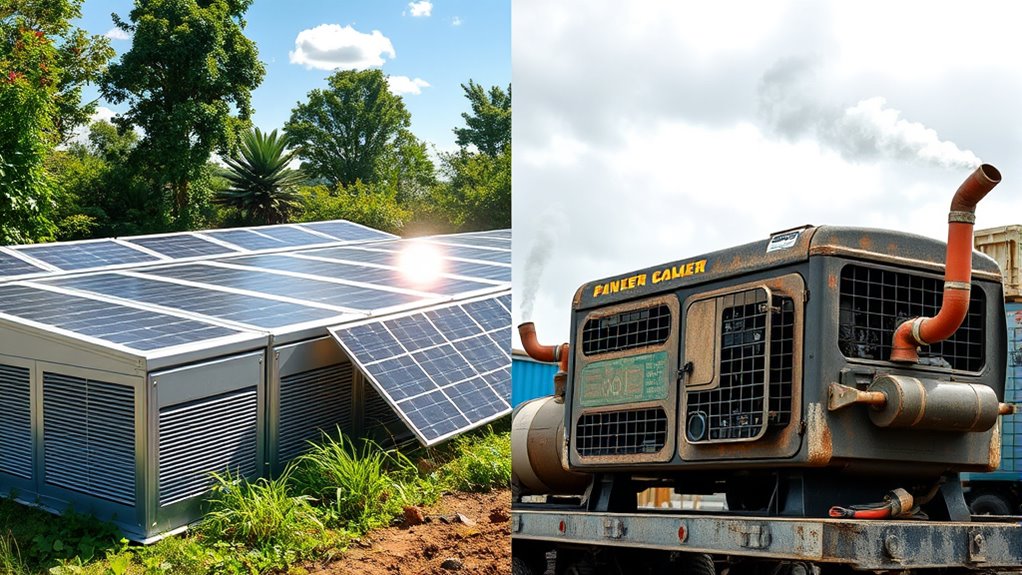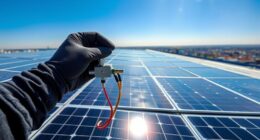When comparing total ownership costs, solar generators tend to be more economical over time despite higher upfront prices. They save you money on fuel, maintenance, and repairs, which add up quickly with gas generators. Although gas models are cheaper initially, ongoing expenses make solar options more cost-effective in the long run. If you want to understand how these factors impact your budget, you’ll find valuable details as you explore further.
Key Takeaways
- Solar generators typically have higher upfront costs but lower long-term expenses due to minimal fuel and maintenance needs.
- Gas generators are cheaper initially but incur ongoing costs for fuel, repairs, and part replacements over time.
- Battery lifespan in solar generators (5-15 years) reduces replacement costs, making them more economical long-term.
- Gas generators require regular maintenance, increasing total ownership costs compared to low-maintenance solar units.
- Overall, solar generators tend to be more cost-effective over time despite higher initial investment.

When choosing between solar generators and gas generators, understanding their key differences can help you make an informed decision. One of the most important factors to contemplate is the total cost of ownership, which includes not just the initial purchase price but also ongoing expenses like battery life and maintenance costs. Solar generators typically have a higher upfront cost, but their long-term expenses tend to be lower. They rely on rechargeable batteries that store energy from sunlight, and these batteries generally have a longer lifespan compared to the fuel-dependent components of gas generators. Over time, you’ll spend less on replacing batteries or dealing with wear and tear, making solar options more economical in the long run.
In contrast, gas generators usually come with a lower initial price, but their maintenance costs can add up quickly. Gas engines require regular servicing, oil changes, filter replacements, and other routine upkeep to keep them running smoothly. These ongoing expenses can be substantial, especially if you use the generator frequently or for extended periods. Additionally, gas generators don’t have a battery component that lasts for many years; their core parts tend to wear out faster, requiring more frequent repairs or replacements. This means that even though the upfront investment might seem smaller, your total ownership costs over time can be higher due to the need for repairs and fuel.
Battery life is another critical aspect when comparing these two options. Solar generators rely on batteries that can last for several years—often between 5 to 15 years depending on the brand and usage—before needing replacement. This longevity, combined with the fact that they don’t consume fuel, reduces ongoing costs and makes them more predictable financially. Gas generators, however, depend on fuel and mechanical components that tend to degrade faster, leading to more frequent repairs and part replacements, which can considerably increase your total cost of ownership over the years. Additionally, the technological advancements in solar power have continually improved the efficiency and durability of batteries, making solar generators a more attractive investment over time.
Ultimately, your choice will depend on how much you prioritize upfront costs versus long-term expenses. If you’re looking for a low-maintenance, cost-effective solution over the long haul, solar generators are generally the better option. They might require a larger initial investment, but their longer battery life and minimal maintenance costs make them more economical over time. Gas generators may work better if you need a less expensive start-up and don’t mind the ongoing costs associated with fuel and maintenance. Knowing these differences helps you weigh the total ownership costs and choose the generator that best fits your needs and budget.
Frequently Asked Questions
How Does Maintenance Frequency Compare Between Solar and Gas Generators?
You’ll find that solar generators require less maintenance and have a simpler maintenance schedule compared to gas generators. Solar units need occasional cleaning and system checks, leading to infrequent repairs. Gas generators, however, demand regular oil changes, filter replacements, and more frequent repairs due to their moving parts and fuel systems. Overall, your repair frequency is lower with solar, making it a more reliable choice if you want to reduce upkeep.
Are There Environmental Tax Incentives for Solar Generator Purchases?
Environmental incentives can be a game-changer, making solar generators more appealing. You may qualify for tax credits and other incentives that reduce your upfront costs, helping you save money while going green. These tax credits often cover a significant portion of your purchase, turning your investment into a win-win for the planet and your wallet. Check local and federal programs to see what incentives are available for your solar setup.
What Is the Typical Lifespan Difference Between Solar and Gas Generators?
You might wonder about lifespan longevity for generators. Generally, solar generators have greater durability factors, meaning they tend to last longer—often 20 to 30 years—because they have fewer moving parts and less wear and tear. Gas generators typically last around 10 to 15 years, depending on maintenance. So, if longevity is your priority, solar generators usually offer a longer lifespan, making them a more durable investment over time.
How Do Battery Replacements Impact Total Ownership Costs?
Did you know battery replacements can considerably affect your ownership costs? With solar generators, battery lifespan typically ranges from 5 to 15 years, but replacement costs can reach up to 40% of the initial investment. When batteries need replacing, you’ll face added expenses, making ongoing maintenance more costly. So, consider how replacement costs influence your long-term budget, especially since gas generators usually don’t require such replacements.
Can Solar Generators Handle High-Power Appliances Effectively?
You might wonder if solar generators can handle high-power appliances effectively. While solar power systems are excellent for many uses, their appliance compatibility depends on the generator’s wattage capacity. High-power appliances require more energy, so verify your solar generator’s surge and continuous wattage meet those demands. For best results, choose models designed for high-power output, making them a reliable option for operating larger appliances confidently.
Conclusion
When you compare the total costs, solar generators blow gas generators out of the water—like, they’re practically a money-saving superhero that’s here to save your wallet from utter destruction. Sure, gas generators might seem cheaper upfront, but the ongoing fuel and maintenance costs add up faster than you can say “expensive mistake.” Go solar, and you’ll enjoy endless free energy with a cost savings so massive, it’s practically a financial miracle!









